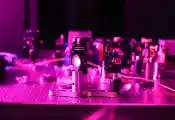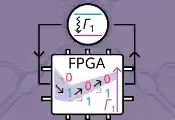Honda Research Institute and BlueQubit Achieve Quantum Image Classification Milestone
April 16, 2025 -- In a landmark collaboration, Honda Research Institute (HRI) and quantum software company BlueQubit have successfully executed image classification on a quantum computer using Honda’s image dataset, a groundbreaking achievement that marks the first of its kind globally. This pioneering project showcases the transformative potential of quantum computing in AI-driven industries, setting the stage for future innovations in automotive technology and robotics.
BlueQubit, which recently secured $10 million in seed funding led by Nyca Partners (TechCrunch), specializes in managed quantum computing solutions. Their Quantum Software as a Service (QSaaS) platform bridges the gap between advanced quantum technologies and practical industry applications in finance, data, medicine and beyond. The successful collaboration with Honda Research Institute highlights the company’s capability to translate quantum potential into real-world outcomes.
Revolutionizing Image Classification with Quantum Computing
Leveraging BlueQubit’s QSaaS platform, the team developed quantum image classifiers tailored to Honda’s proprietary dataset, known as the Honda Scenes Dataset, an extensive collection of dynamic driving scenes captured across diverse environments. These classifiers were deployed on cutting-edge quantum hardware from IBM and Quantinuum, demonstrating the feasibility of quantum-enhanced image processing in real-world applications.
The project explored multiple quantum data encoding techniques, including Approximate Amplitude Encoding (AAE), Block Amplitude Encoding (BAE), and Piecewise Angle Encoding (PAE). The classifiers were trained using classical simulations and then deployed on quantum processors, achieving impressive accuracy rates. Notably, the BAE method yielded the highest performance, achieving an accuracy of 94%, comparable to state-of-the-art classical convolutional neural networks.
Real-World Impact and Quantum Advantage Preparation
This collaboration is more than a technological milestone; it serves as a blueprint for industry adoption of quantum computing. By successfully running quantum image classifiers on actual hardware, Honda and BlueQubit have demonstrated the practical viability of quantum applications in sectors where AI and machine learning play critical roles.
“Quantum technology is no longer a distant promise, it’s here, and it’s making a tangible impact,” said Hrant Gharibyan, CEO & Co-Founder of BlueQubit. “Our partnership with Honda Research Institute not only showcases the potential of quantum computing in automotive applications but also provides a roadmap for other industries to prepare for the quantum advantage.”
The quantum advantage refers to the point where quantum computers outperform classical systems in specific tasks. The advancements made in this project suggest that such breakthroughs could deliver performance improvements of up to 10 times over traditional computing methods, particularly in complex image processing tasks essential for autonomous driving and advanced robotics.
Technical Achievements and Hardware Performance
The experiments utilized IBM’s Brisbane and Fez quantum processors, as well as Quantinuum’s system models H1 and H2. These devices, ranging from 20 to 156 qubits, enabled the team to test and validate their quantum classifiers across varying hardware configurations. The results showed remarkable consistency and performance, even with deep circuits involving thousands of two-qubit gates.
On Quantinuum’s H2 device, the team successfully implemented Block Amplitude Encoding across four blocks of 14 qubits each, achieving a classification accuracy of 94%. Similarly, on IBM’s Fez processor, experiments with up to 72 qubits demonstrated robust performance, with accuracy rates significantly surpassing random classification benchmarks, even in the face of increasing circuit complexity.
Future Directions and Industry Implications
The success of this project paves the way for broader adoption of quantum computing in AI-driven industries. By showcasing how quantum classifiers can handle complex image data, Honda and BlueQubit have set a precedent for future research and development in fields such as autonomous vehicles, robotics, and beyond.
As quantum hardware continues to evolve and become more accessible, the methodologies and findings from this collaboration will serve as a foundation for future advancements. Companies looking to stay ahead in the rapidly evolving tech landscape are encouraged to explore quantum solutions now, preparing for the inevitable quantum-powered breakthroughs on the horizon.




































